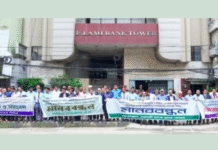
Farmers are showing interest to use more of their lands to cultivate hybrid rice, encouraged by an increase in domestic market prices, said seed sellers yesterday.
In the ongoing Boro cultivation season, seed sellers expect to sell nearly 14,000 tonnes of hybrid rice seeds, around 12 per cent higher year-on-year.
“It is because paddy prices are attractive while hybrid rice cultivation provides increased yield,” said FH Ansarey, managing director and CEO of the agribusiness division of ACI, one of the major business houses.
Another draw is the scope to harvest the grain in a shorter period than popular inbred variety BRRI Dhan 29, he said.
Farmers usually grow hybrid rice during the dry Boro season to reap benefits of the higher yield.
For the current Boro season, the Department of Agricultural Extension (DAE) aims to ensure cultivation of hybrid rice on 13.3 lakh hectares of land while all types on 49.77 lakh hectares.
Badal Chandra Biswas, the DAE director (in-charge) of field services wing, expects the area with the hybrid to be higher than the 13 lakh hectares achieved the previous year.
Growers are showing interest to grow hybrid rice as paddy prices are higher this year, said Mohammad Masum, chairman of Supreme Seed Company, one of the oldest seed companies.
Yesterday the retail price of coarse grain was as high as Tk 55 per kilogramme, which was 10 per cent higher than that a year ago as per the Trading Corporation of Bangladesh.
There is good demand for inbred rice seeds too, said Masum, adding that it was important to ensure adequate supply of fertiliser.
Farmers in many places are having to buy fertilisers and pesticides at high prices as cost of import had risen with the rise in the price of the US dollar, he added.
Farmers planted hybrid rice, which provides at least 20 per cent higher yield than that from inbred or high yielding varieties, on only 6.60 lakh hectares of land out of 45.17 lakh hectares during the Boro season in fiscal year 2016-17.
Cultivation increased gradually as the food directorate started buying all sorts of rice irrespective of quality and size of grains.
Marketing campaigns and introduction of more varieties by the companies also buoyed cultivation of hybrid rice.
“Now we have finer varieties of hybrid rice too,” said Masum.
Md Mostafizur Rahman, member director for seed and horticulture at Bangladesh Agricultural Development Corporation, said the agency sold its whole stock of 1,000 tonnes of hybrid seeds this year.
Demand is very high this season, he added.


 For all latest news, follow The Daily Star’s Google News channel.
For all latest news, follow The Daily Star’s Google News channel.







